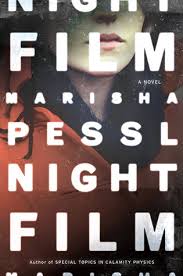It would seem contrary and perhaps churlish to abandon a 600-page novel a mere 120 pages before the end. Yet this is precisely what I almost did with Marisha Pessl’s second novel, a voluminous horror epic entitled Night Film. I did soldier on to the end – more for reasons of fairness than out of any hope that the book might, after all, turn out to have been worth my time. I knew already in my gut that the enterprise was doomed, the one unanswerable question remaining: what was she thinking???
I was keen to read Night Film from the moment I first heard about it – a ‘serious’ horror novel about a fictional director of horror movies, examining ideas of truth and fiction and making use of a metafictional format, what’s not to like? Plenty, according to Steven Poole of The Guardian, although his unequivocally damning review made me even more curious, if anything. Horror is a woefully misunderstood genre. Perhaps Poole’s review was yet one more instance of a mainstream critic getting it wrong. I loved the look of the book as object – all those found-footage-style embedded texts and general stuff. I wondered if Night Film was, after all, the horror novel of the year that everyone had missed.
The short answer is: no, it isn’t. I’d say the only thing wrong with Poole’s review is that it doesn’t go far enough in unmasking an essay in genre that is flat, unconvincing, derivative and, most of all, in no way justifies its length. It’s ludicrous that a book that finally contains so little should run on for so long. I ask again: what was she thinking???
 Horror film is an irresistible subject, both for horror readers and for horror writers. We might point to Ramsey Campbell’s Ancient Images and The Grin of the Dark, Paul Auster’s The Book of Illusions, Theodore Roszak’s masterful Flicker, the late, great Joel Lane’s superb novella The Witnesses are Gone as examples of novels that delve into the idea of the ‘lost film’ or the ‘mad’ director whose work embodied the concept of the forbidden, the transgressive, the Bad Genius. I love books like this – both because I’m a (not so closet) horror film fan myself, and because the theme of the ‘lost text’ offers countless possibilities for the kind of fascinatingly complex narrative structure I particularly enjoy.
Horror film is an irresistible subject, both for horror readers and for horror writers. We might point to Ramsey Campbell’s Ancient Images and The Grin of the Dark, Paul Auster’s The Book of Illusions, Theodore Roszak’s masterful Flicker, the late, great Joel Lane’s superb novella The Witnesses are Gone as examples of novels that delve into the idea of the ‘lost film’ or the ‘mad’ director whose work embodied the concept of the forbidden, the transgressive, the Bad Genius. I love books like this – both because I’m a (not so closet) horror film fan myself, and because the theme of the ‘lost text’ offers countless possibilities for the kind of fascinatingly complex narrative structure I particularly enjoy.
Night Film begins promisingly enough. Ashley Cordova, the daughter of notorious and reclusive film director Stanislas Cordova, is found dead at the bottom of a lift shaft of a derelict warehouse. Her death looks like suicide, but for journalist Scott McGrath, whose career was wrecked by a discredited investigation into the satanic mysteries of Cordova some years before, it also provides the perfect opportunity for him to reclaim his reputation.
Cordova’s films are extreme in nature, at least as scary as his devout legions of fans. Pessl’s narrative is interspersed with newspaper reports, police files, and screenshots taken from the underground internet fan site The Blackboards. (‘You shouldn’t be here – Get Out.’) For the first third of the novel I was entranced, convinced that Pessl’s reams of unnecessary italics and the dorkish sensibilities of her protagonist would turn out to contain some kind of ironic subtext, that the novel was setting itself up as a straightforward and increasingly predictable ‘hunt’ narrative only for the deliberate purposes of knowingly undermining itself later.
Why else would Scott McGrath be such a retrograde knob? Why else would each and every so-called witness, all desperately elusive only in fact not, commit the sin of the ‘you will die horribly, Mr Bond, but not until I have outlined for you in painstaking detail my dastardly plan for world domination’ trope, one after the other? Why else would the book be so… goddamned… long???
The answer is: I don’t know. The story revealed by Night Film is wholly unoriginal, itself a retread of so many bog standard Hollywood horror movies. Pessl’s pretty textual gimmicks turn out to be nothing more than stage decoration. An accusation commonly levelled at so-called ‘literary SF’ is that it insists on reinventing the wheel. In eight cases out of ten I wouldn’t find much to argue with in such a statement, only that the literary merit of some of these offerings makes them at least worthy of further discussion. In the case of Night Film, we have a novel that in terms of its contribution to horror literature is less than negligible. And while Pessl’s writing is competent and demonstrates some nice turns of phrase, these in no way justify the appalling bloat you have to wade through to get to them.
My advice to the author? Get out there and read some decent horror before you try writing any more. My advice to readers? This book is a time-thief – don’t go there.